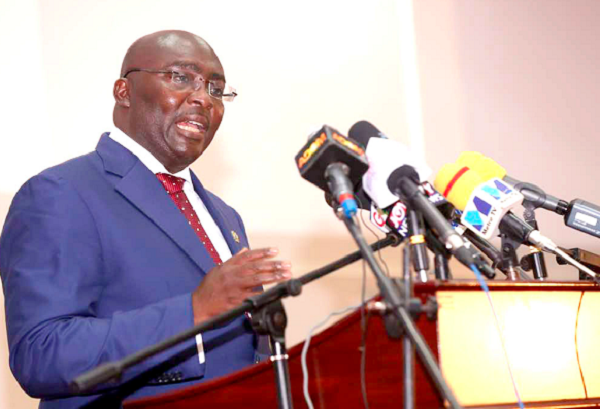
16.5 Million digital addresses ready
About 16.5 million digital addresses have been captured as part of moves by the government to create a national database of digital addresses for all geographical locations in the country, the Vice-President, Dr Mahamudu Bawumia, has said.
Advertisement
“It is unbelievable. We have been able to put together 16.5 million digital addresses. Every five by five metre square in Ghana has a unique address. When you look at the post-code, you will be able to immediately tell the region, district and the address,” the Vice-President said.
Delivering the third Advancement Lecture series organised by the Institutional Advancement Office of the University of Cape Coast (UCC) in Cape Coast last Wednesday, Dr Bawumia said the technology would be fully launched in two weeks.
His lecture was on “Developing Stronger Economies for the African Continent: The Missing Link.”
Major value for money
“What is very interesting is, because we are focused on value for money, when we were looking for this digital addressing system, we had all sorts of proposals. Someone said $70 million, another said $100 million and so on.
“But finally, after all the work that was done, this massive system that is going to transform this economy was only done for $2.5 million.
What is even more exciting about the new address system is that it was actually designed by Ghanaians in Dansoman. I am telling you, our men and women are good. They are amazing and they beat the international competition. They just beat the international competition,” he said.
He added that when the idea of what the country required in putting up the digital addressing system was planned, there were doubts if the capacity for its execution by Ghanaians was possible “but they surprised us.’’
“We had major value for money and it was done in Ghana. If you want value for money, you can get it in Ghana,” he explained
Dr Bawumia said when the government came into office, its desire was to use the existing technology to establish a national digital system.
That task that the government set out to do, he said, had been accomplished.
He said the system was going to provide the most advanced addressing system in the world.
“It is more advanced than that of the United States, the United Kingdom, Sweden or Germany because they are stuck with old technology. We are leapfrogging. We are going to the GPS-based technology,” he added.
Throwing more light on the technology, Dr Bawumia said: “Even if you are standing in the middle of the River Oti, and you want your address and we roll it out, you will know your address.”
Also, he said, the technology would allow the waakye seller in any part of the country to say “this is my address and the system will locate her exactly where she is.”
More possibilities
Dr Bawumia also announced that the online registration of businesses would begin in two weeks’ to afford businessmen and women the opportunity to register their businesses online without any hassle.
With the new system, he said, it ought to be possible for business registration to be done in a day or few days as compared to the months and longer periods that prevailed in the past.
Touching on the theme of his presentation, the Vice-President said although Ghana, for example, graduated from a less developed economy status to lower-middle income country status in 2007, the recent fall in world commodity prices of oil, minerals and cocoa, ought to be a reminder of how vulnerable the economy was to external shocks.
“We are faced with the risks of being trapped in this status if we don’t push our productive capacities beyond the mere extraction and exports of raw commodities.
We want a Ghana in which we add value to our raw materials. We want a Ghana beyond aid. We want to build a knowledge-based economy. To do all of these, we must build our productive capacity as a nation: This is the missing link to building strong economies in Africa,” he added.
Dr Bawumia said a country could attain low-middle income status by tapping into its natural resource endowments, by undertaking appropriate market and financial sector reforms, and by opening up external trade opportunities through good macroeconomic management and through good and stable governance.
Roles to be played
Going forward, he said, the UCC had a role to play.
“Nurturing and stimulating creative thinking, undertaking basic research in problems confronting society and informing public policy making are the least we should expect from universities,” he urged.
Dr Bawumia said universities could not afford to decouple themselves from tackling the challenges in the society.
The Vice Chancellor (VC) of UCC, Prof. Joseph Ghartey Ampiah, who chaired the function, said African economies were wobbling and that there was evidence that Africa accounted for just a little over two per cent of the world’s total gross domestic product (GDP) even though the continent was inhabited by 12 per cent of the world’s population.
“It is quite disturbing, for example, that the entire GDP of sub-Saharan Africa, a significant chunk of Africa, is only just about the GDP of South Korea,” he bemoaned.



